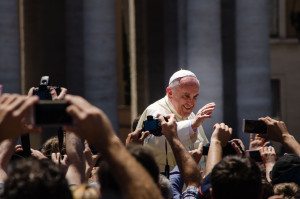Armenian Genocide: Turkey vs. Everyone Else
Historians estimate that upwards of 1.5 million Christian Armenians, living in the Ottoman Empire (present-day Turkey), were massacred in what is widely considered the “greatest atrocity of the Great War.” This past week, Turkey once again challenged the classification of the 1915 mass killings as a genocide, a claim Turkish authorities have continually justified over the last century by stating that the deaths “ happened in wartime, when plenty of other people were dying.” Although Turkey acknowledges that the executions took place, they deny that their wartime actions were genocide, instead arguing that the killings were neither planned nor systematic.

In spite of this stance, in April 2014, the Turkish government offered its condolences to the descendants of Armenians killed by Ottoman forces. In a surprising and unprecedented move by Ankara, the released statement was sympathetic and contained signs of potential conciliation between Turks and Armenians. “We wish that the Armenians who lost their lives in the context of the early 20th century rest in peace, and we convey our condolences to their grandchildren,” the statement read, in a recognition that gave hope to the 100,000 Turkish Armenians, and Armenians worldwide. Since then, however, progress towards the recognition of the Armenian genocide seems to have come to a halt.
The European Union and Pope Francis are among those who have recently positioned themselves against Turkey on this issue. Both the European Parliament and the leader of the Catholic Church condemned the mass killings of Armenian Christians last week, labelling it a genocide. In a bold move, the Pope proclaimed that the executions were the “first genocide of the 20th century,” and urged world leaders to unite against anti-Christian violence. In response, the Turkish government announced its disappointment with the pontiff’s declaration, and withdrew its ambassador to the Holy See. Commenting on the rising tensions between the Vatican and Islam, Turkey’s Foreign Minister Mevlüt Çavuşoğlu tweeted, “Religious offices are not places through which hatred and animosity are fueled by unfounded allegations.” In another controversial move, Etyen Mahcupyan, the chief Armenian advisor to Turkey’s Prime Minister announced his early retirement following his admission that the mass Armenian killings were indicative of genocide.
On April 24, to honor the 100th anniversary of the first Armenian exterminations in Istanbul, countries all over the world are planning memorial ceremonies; Turkey, however, is not one of them. Instead, Ankara has rescheduled a commemoration event of the Battle of Gallipoli, one of the Ottoman Turks’ defining World War I victories, so that it falls on the same day. By hosting an event that celebrates and reinforces the identity of modern Turkey, President Erdoğan is suggesting that he, like his predecessors, will probably continue to deny the Armenian genocide.
Despite widespread criticism and accusations of Erdoğan’s “cheap politics,” several prominent guests will be in attendance. Among them, Prince Charles and Prince Harry of Great Britain, Australian Prime Minister Tony Abbott, and New Zealand’s Prime Minister John Key will be representing the Allied countries that participated in the battle. Worried about the legitimacy this action might give Turkey, Armenians have been quick to censure Turkey’s blatant attempts to “divert international attention from the commemoration of the massacre,” and absolve themselves of any blame.
Rejecting the European Parliament’s resolution for Turkey to accept responsibility for the genocide, Erdoğan stated on April 16, “Those who try to charge Turkey by using the pains of the past as a pretext are being unfair to history above all. Those who try to make Turkey accept things like genocide, that by no means took place, as if it is an absolute reality, are working in vain.”
Turkish Americans have recently launched an organization called “Let History Decide,” which is dedicated to raising “awareness” about “unresolved issues” during World War I and counteracting the Armenian perspective. In an attempt to deny the genocide by “letting the facts speak for themselves,” Turkey and its advocates are showing no signs of concession. As a result, Turkey’s government is in a precarious position internationally, and seems to be continuing an indefinite stalemate with its scorned Armenian population.
